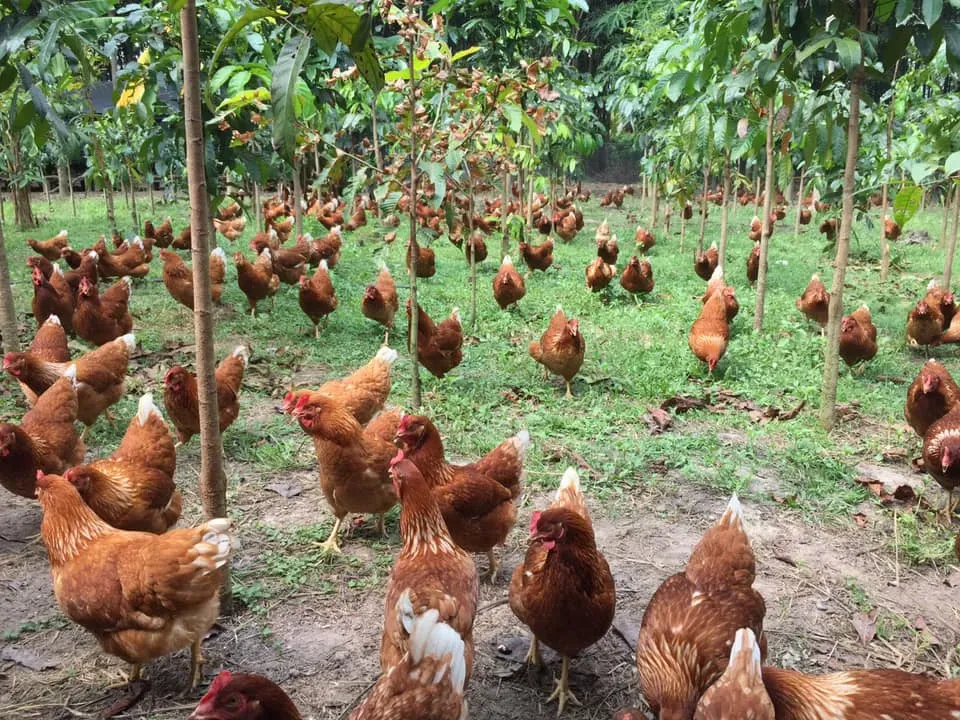Are Organic Free-Range Eggs Really Better for Your Health?
Eggs are a go-to food in many homes. They’re easy to cook, versatile, and full of nutrients. But when you’re at the store, staring at all the egg cartons, it can feel like a puzzle. Regular eggs, free range eggs, organic free range eggs, Organic Egg Size M—what do these terms mean, and are HappyLyfe’s organic free range eggs really better for your health? Let’s break it down in simple words, exploring what makes our eggs special and whether they’re worth choosing for your health.
What Are Free Range Eggs?

Let’s start with free-range eggs. This term describes how the hens are raised. Unlike regular eggs, which often come from hens kept in small cages or crowded indoor spaces, free-range eggs come from hens that can go outside. At HappyLyfe, our hens have access to fields or pastures where they can roam, peck, and scratch the ground. This more natural life could mean healthier, happier chickens—and possibly better eggs.
But here’s the thing: “free range” doesn’t always mean a perfect outdoor paradise. Some producers might only provide a small concrete area and call it “outdoor access.” Regulations for “free range” differ by country, and some stretch the term to sound better. At HappyLyfe, we ensure our free-range eggs come from hens with real outdoor space, giving them a better quality of life than caged hens.
What Makes HappyLyfe’s Organic Free Range Eggs Different?
Now, let’s talk about our organic free-range eggs. These eggs come from hens that not only get outdoor access but are raised under strict organic standards. For example, our Organic Egg Size M comes from these carefully raised hens.
HappyLyfe’s organic free-range eggs are a premium choice, but do they really make a difference for your health? To answer that, we’ll look at nutrition, animal welfare, and environmental impact to see if our eggs stand out.
Also Read: Welcome to HappyLyfe: Discover Our Enhanced Website and Mobile App
Nutritional Differences: Do They Matter?
Eggs are already a superfood. They’re packed with protein, healthy fats, vitamins like B12 and D, and minerals like selenium. One egg has about 6 grams of protein and roughly 70 calories, making it great for a balanced diet. But are HappyLyfe’s organic free-range eggs healthier?
Some studies suggest that free-range eggs and organic free-range eggs might have a slight edge over regular eggs. Hens that roam outdoors and eat a varied diet, like grass, bugs, and our organic feed, may produce eggs with more omega-3 fatty acids, which support heart health. There’s also evidence of slightly higher levels of vitamins A and E in free-range eggs. Our Organic Egg Size M, for instance, might have these nutrients in slightly higher amounts because of the organic feed and outdoor foraging.
That said, the nutritional gap isn’t always huge. A 2010 study in the Journal of Agricultural and Food Chemistry found that eggs from pasture-raised hens had about twice the omega-3s and 50% more vitamin E than caged hens’ eggs. The difference between free-range eggs and regular eggs is often smaller, and our organic free-range eggs don’t always show a dramatic boost. For most people, these slight differences won’t transform your health, especially if you already eat a variety of nutrient-rich foods. But if you’re aiming to boost omega-3s or vitamin E, HappyLyfe’s organic free-range eggs could be a smart pick.
Animal Welfare and Ethical Choices

Health isn’t just about what’s in the egg—it’s also about how your food choices align with your values. At HappyLyfe, we know many people choose our free-range eggs and organic free-range eggs because they care about the hens. In conventional egg production, hens often live in tight cages with little room to move or act naturally. This can cause stress and health problems for the chickens.
Our free-range eggs come from hens with outdoor access, which is better for their well-being. Our organic free range eggs, like Organic Egg Size M, go further—our hens have more space and a diet free from synthetic chemicals. If you value animal welfare, choosing HappyLyfe’s organic free-range eggs supports better living conditions for hens.
Environmental Impact
We also care about the planet. Organic farming practices, like those we use for our organic free range eggs, aim to be sustainable. Our hens’ feed is grown without synthetic pesticides or fertilizers, which helps reduce pollution and protect soil health. Plus, our organic farms encourage biodiversity, letting our hens roam in pastures that support local ecosystems.
That said, no system is perfect. Organic farming can sometimes use more resources, like transporting organic feed. Still, we believe the environmental benefits of our organic free-range eggs make them a great choice for those who want to support greener farming.
Also Read: Cannabinoids for Chronic Pain: A Study
Taste and Quality
Do HappyLyfe’s organic free-range eggs taste better? Some people say our free range eggs and organic free range eggs have a richer, fresher flavor. Hens that eat a varied diet, like grass and insects alongside our organic feed, may produce eggs with darker, more vibrant yolks. Our Organic Egg Size M often has this rich yolk color, which some associate with better taste.
But taste is personal. There’s no solid proof that our organic free-range eggs always taste better than regular eggs. Freshness matters most—eggs that are just a few days old will taste better than older ones, no matter the type. We ensure our eggs reach you fresh to maximize flavor.
Making the Choice
So, are HappyLyfe’s organic free-range eggs really better for your health? It’s not a simple yes or no. Nutritionally, our eggs may have small benefits, like more omega-3s or vitamin E, but these differences are often modest. For most people, any egg—regular, free range eggs, or our organic free range eggs—is a healthy choice. The bigger reasons to choose HappyLyfe’s organic free range eggs are ethical and environmental. If you care about happy hens and sustainable farming, our Organic Egg Size M is a great option.
Ultimately, the best egg depends on what matters to you. Try a carton of HappyLyfe’s organic free range eggs and see if you notice a difference in taste or feel good about supporting our values. Eggs are a fantastic food, so whether you choose our free range eggs or another type, you’re getting a nutrient-packed ingredient that’s a kitchen favorite.
Frequently Asked Questions
1. What makes HappyLyfe’s organic free range eggs different from regular eggs?
Our organic free range eggs come from hens raised with outdoor access and fed organic, chemical-free feed. Unlike regular eggs, which often come from caged hens, our hens live a more natural life, which may lead to slight nutritional benefits and supports better animal welfare.
2. Are HappyLyfe’s free range eggs the same as organic free range eggs?
Not quite. Our free range eggs come from hens with outdoor access, but our organic free range eggs, like Organic Egg Size M, follow stricter organic standards, including organic feed and no antibiotics or hormones.
3. Do HappyLyfe’s organic free range eggs have more nutrients?
Some studies show our organic free range eggs may have higher omega-3 fatty acids and vitamins A and E due to the hens’ diet and outdoor access. However, the nutritional difference is often small and may not significantly impact your health if you eat a balanced diet.
4. Why should I choose HappyLyfe’s Organic Egg Size M for ethical reasons?
Our Organic Egg Size M comes from hens raised with more space, natural behaviors, and organic feed. Choosing these eggs supports better animal welfare and sustainable farming practices, aligning with ethical and environmental values.
5. How can I tell if HappyLyfe’s organic free range eggs are fresher or tastier?
Freshness is key to taste. Our organic free range eggs, like Organic Egg Size M, often have vibrant yolks due to the hens’ varied diet. Try them in your favorite recipe to see if you notice a richer flavor, but freshness matters more than the egg type.

 English
English
 Thai
Thai